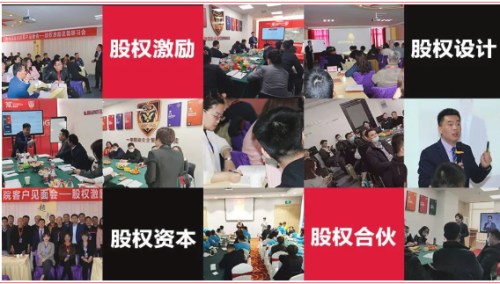公司是营利性的组织,创办公司和运营公司的终目的就是赚钱,这是创始人在股权架构搭建之初的一般目的。当然,也不排除个别情况下创办公司是为了实现个人情怀和梦想,但离开资金和资本的支撑,估计无论什么样的情怀和梦想都只是一个梦想而已。
A company is a for-profit organization, and the ultimate goal of founding and operating a company is to make money, which is the general purpose of the founder at the beginning of the equity structure construction. Of course, it is not ruled out that in some cases, starting a company is to achieve personal feelings and dreams, but without the support of funds and capital, it is estimated that no matter what kind of feelings and dreams are just a dream.
正如西汉著名史学家、文学家司马迁在《史记》的-百二十九章“货殖列传”所述,“天下熙熙,皆为利来;天下攘攘,皆为利往”。其实,趋利避害是人的本能,追逐利益也是人的本性,本身是没有错的,只不过,在追逐利益的过程中,是选择利人利已还是选择损人利己,这就涉及对人性的考验和道德的评判了。
As the famous historian and writer of the Western Han Dynasty, Sima Qian, stated in Chapter 1229 of the "Records of the Grand Historian", "When the world is prosperous, all is profit; when the world is bustling, all is profit. In fact, pursuing benefits and avoiding harm is human instinct, and pursuing benefits is also human nature. It is not wrong in itself. However, in the process of pursuing benefits, whether to choose to benefit oneself or harm others involves the test of human nature and moral judgment.
公司是由人和资本组合而成的社团组织,在追逐利益、实现利益的过程中,必然会涉及内部利益的平衡问题,如何把握其中的尺度,并终实现各个参与方的利益大化,考验创始人的智慧,也体现创始人的胸怀和格局。那么
济南股权架构设计先利他还是先利己呢?
A company is a social organization formed by the combination of people and capital. In the process of pursuing and realizing benefits, it inevitably involves the balance of internal interests. How to grasp the scale and ultimately maximize the interests of all parties involved, tests the wisdom of the founder, and also reflects the founder's mind and pattern. So does Jinan's equity structure design prioritize altruism or self-interest?
每一位创业者都是不轻松的,背后都有一段令人敬佩的辛酸史。创业过程中,有的甚至自绝后路,背水战,承担着巨大的心理压力。
Every entrepreneur is not easy, and behind it lies an admirable and poignant history. In the process of entrepreneurship, some even turn their backs and face immense psychological pressure.
在这种情况下,要求创业者们就先利他还是先利己做出选择,的确比正常状况下更难。成功的大企业往往会有这样的感受:企业终是社会的,而且规模越大,承担的社会责任越多,尤其是巨无霸企业,更是如此。但是对于初创企业而言,能够生存下来比什么都重要,还承担不了什么高大上的社会责任。
In this situation, it is indeed more difficult than normal for entrepreneurs to make a choice between being altruistic or self-interested first. Successful large enterprises often have the feeling that they are ultimately social, and the larger the scale, the more social responsibility they undertake, especially for large and medium-sized enterprises. But for startups, being able to survive is more important than anything else, and they cannot shoulder any lofty social responsibilities.

所以对于先利他还是先利己这个问题,不同行业、不同规模、不同成熟度的企业都有不同的标准,不同的老板和创始人也都有自己的判断。一般而言,在进行判断和选择时,下面两个因素是要考虑的:
So for the question of whether to prioritize altruism or self-interest, companies of different industries, sizes, and maturity have different standards, and different bosses and founders also have their own judgments. Generally speaking, when making judgments and choices, the following two factors need to be considered:
(1)控制权的归属。无论选择哪一个顺序,都应该在--个基本的逻辑前提下做出,即老板或者主要创始人应该对公司拥有不可动摇的控制权。在此前提下,先利他或者先利已才是可控的,而不是被迫的,这对于实现创业初衷、带领公司迅速成长具有相当重要的掌控意义。
(1) Ownership of control. No matter which order is chosen, it should be made based on a basic logical premise, that is, the boss or main founder should have unshakable control over the company. Under this premise, it is controllable to prioritize others or others, rather than being forced, which has significant control over achieving the original intention of entrepreneurship and leading the company to grow rapidly.
(2)价值观的判断。利己是本能的追求,也是存续和发展的本钱,完全大公无私,甚至“毫不利己、专门利人”,就成了做慈善,而不是做企业了。
(2) Judgment of values. Self interest is an instinctive pursuit and also the capital for survival and development. Being completely selfless, even "selfless and dedicated to benefiting others", becomes becoming a charity rather than a business.
利他解决的是激发人的原动力的问题,通过奖金、股权等物质手段的刺激,唤起内心深处的斗志,为协同实现企业的目标而奋力前行。因此,这两个选项的价值方向是不一样的,但是,如果能够从更高的角度看,通过先成就他人而终成就自己,形成“激励相容”效应,那就是大智慧。
Altruism solves the problem of motivating people, using material means such as bonuses and equity to stimulate their inner fighting spirit and strive to achieve the goals of the enterprise through collaboration. Therefore, the value direction of these two options is different, but if we can look at it from a higher perspective, by achieving others first and ultimately ourselves, forming a "motivational compatibility" effect, it is great wisdom.
How to apply this great wisdom based on the actual situation of the enterprise may have multiple standards for each enterprise, but from the perspective of ultimate values, achieving self-interest through altruism is indeed a high level. For more related content, come to our website http://www.daoshangbao.com consulting service

